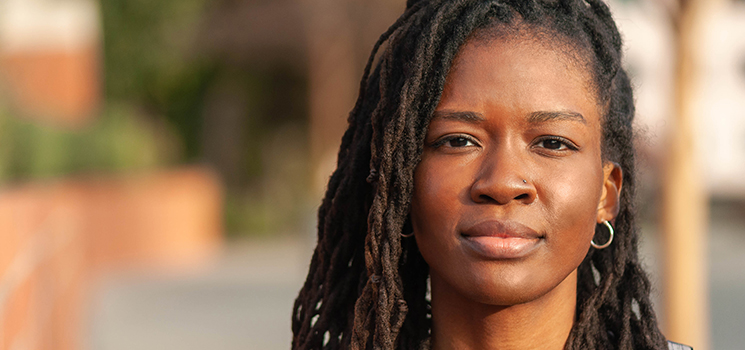News

Thinking Out of the Box
Danielle A. D. Howard's winning essay uses themes of Afrofuturism to examine the story of Henry Box Brown
By Noela Hueso
It’s an extraordinary account: How in 1849, Henry Box Brown, an enslaved man, hid in a wooden crate marked “dry goods” and had himself shipped from a Virginia plantation to abolitionists in Pennsylvania. After a rough 27-hour trip, he emerged from his confines as a free man. Years later, he found perhaps even greater liberty in England, where he became a magician and a showman, reenacting his remarkable feat for appreciative audiences.
Cleveland, Ohio native Danielle A. D. Howard first encountered the story of Brown in Daphne Brooks’ book Bodies in Dissent: Spectacular Performances of Race and Freedom, 1850-1910. Brooks’ analysis of the account inspired Howard, a Theater and Performance Studies Ph.D. candidate at the UCLA School of Theater, Film and Television, to write an essay that has just been named the winner in the 31st Annual Student Essay Contest hosted by the respected TDR: A Journal of Performance Studies. The recipient of a $1,000 prize, her work will be featured in a future issue of TDR along with a spotlight look at UCLA TFT’s Theater and Performance Studies program.
In writing her essay, Howard knew she wanted to look at Brown’s story through a different lens. Already a well-known slave narrative in African American literature, more than one scholar has compared Brown’s emergence from the box, symbolically, to the resurrection of Jesus. The fact that Brown sang a Biblical psalm when he stepped out of the crate further reinforced the analysis. Instead, after encountering the Afro-futuristic poems of Nathaniel Mackey, Howard was inspired to link Brown’s story with themes of Afrofuturism, choosing to look at how Black figures in science fiction, and their imagined way of life “could inform our understanding of Henry Box Brown,” she says. “I wanted to theorize around ways in which what Brown was doing in his ‘future’ as a showman-mesmerist was really being enacted in his ‘past’ as an enslaved person who then envisioned freedom in a particular way — and did something that no one would ever think was imaginable.”
Howard’s approach led her to study Einstein’s theory of relativity and read 19th-century science fiction narratives such as H.G. Wells’ The Time Machine, among other things.
“I was interested in understanding popular science and what that looked like in England in the 1800s and the early 1900s,” she says. “I wanted to examine how it informed the way people treated each other.” What she discovered was that race was often “tethered to some type of scientific explanation…scientists at the time were trying to articulate ways to segregate and subordinate people based on what they looked like.”
In her essay, “The (Afro) Future of Henry Box Brown: His-story of Escape(s) Through Time and Space,” Howard argues that Brown’s first sign of freedom wasn’t visual but rather audible, that “one of the first signs was actually a listening experiment between the person receiving the box and Brown,” she says. “I take the reader through an aural understanding of how music and the voice was very pertinent to the way that we should consider the life of Henry Box Brown.”
The essay also analyzes the fact that Brown, “constructed an identity for himself that wasn’t one that he was given at birth,” and instead of hiding after his escape, chose a very public life in England, putting his method of achieving freedom on display as a form of entertainment.
“I’m interested in the implications of this first escape happening in one context and this reenactment having an entirely different context,” she says. “There’s inspiration there because we as humans navigate these intersectional identities. Some of them are imposed upon us (an enslaved body that did not have an identity other than property), some of them we learn, some of them we decide on later.”
While the focus of her essay differs from that of her doctoral dissertation, which looks at ways Black basketball players use movement to embody cultural history and experience elements of freedom, Howard says the two share similarities.
“I see them both as contributing to a genealogy of how Black people who were specifically curtailed to certain areas of expression, utilize virtuosity and movement to underscore self-actualization, to understand their identity outside of white-dominated representations," she says, adding that “some of the questions that I asked in the Brown piece start to percolate in my dissertation.”
Professor Michelle Liu Carriger, who suggested that Howard apply to the TDR contest, and who won the prize herself in 2013, says that Howard’s essay is very timely.
“While this work was remarkable a couple years ago when Danielle was first developing it, I think 2020 is a year that truly needs Henry Box Brown in the way that Danielle writes and theorizes him as a Black individual up against overwhelming odds, taking creative and unexpected measures to combat them on both individual and collective levels,” Carriger offers. “The essay doesn’t gloss over the heavy burden and legacies of the past yet offers ultimately hopeful ways of addressing the future.”

Posted: December 14, 2020





